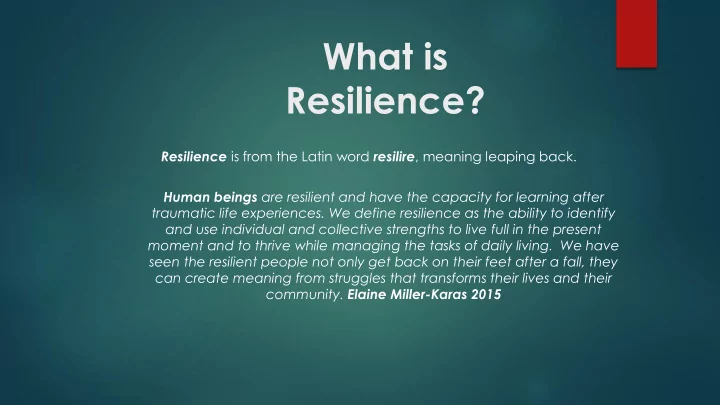

What is Resilience? Resilience is from the Latin word resilire , meaning leaping back. Human beings are resilient and have the capacity for learning after traumatic life experiences. We define resilience as the ability to identify and use individual and collective strengths to live full in the present moment and to thrive while managing the tasks of daily living. We have seen the resilient people not only get back on their feet after a fall, they can create meaning from struggles that transforms their lives and their community. Elaine Miller-Karas 2015
What is Youth Resilience ? Youth are more likely to achieve healthy, favourable outcomes and to thrive if they are resilient . Resilience is the process of managing stress and functioning well even when faced with adversity and trauma. Traumatized children who are involved in their own healing feel empowered-transformed from victims to survivors and thrive. Circle of Courage
What are the ideal factors needed to build Resilience in a Young Person Caring Parents Other Supportive Adults Positive Peer Support Good friendships Positive School experience Protective Teachers Safe Communities Good problem solving skills Self Awareness Value & Beliefs systems Spirituality Sense of Purpose
How can we build Resilience in our Young People in the Hidden Community Project By using 4 Key Principles from the Circle of Courage Model Belonging and Attachment Youth - who bond with Staff and Peers engage in more pro-social behaviour Mastery Motivation & Achievement - Relation in support and interest in school, youth centre and youth project lead achievement gains and better community adjustment Independence Autonomy -Staff teams who respect youth foster their turn-around to pro- social behaviour Generosity Altruism- Caring is demonstrated by peer healing directly countering climates of victimization
Circle of Courage Larry K. Brendtro & Martin L. Mitchell
5 Key strengths for building Resilience Nurturing Relationships Healthy Relationships begin and grow as we show each other that we care about what each other has to say, how we feel, and our interests. Establishing Routines- Share routines, boundaries, traditions and activities give dependable rhythm to family, friend, peers and caring adults. Maintaining Expectations Each person participates in and contributes to family life and Social life. Shared expectations require conversation and talking through topic and issues. Adapting to Challenge Every Family faces difficulties, large and small. The ways families together adapt to those changes helps them through adversity Connecting to Community Community connections, relationships and participation sustain, shape and enrich how families live their lives together.
Parent Support Family intervention Learning Dreams Parent classes Stress management Health and Wellbeing School support Education and training Learning Dreams Monthly support group last Friday of the month Shared Experiences (Conflict Legacy Support) Complementary Therapies One to one support
Level 1 Juniors Age 7-11 year olds Early intervention A* programme in Primary Schools Replicating the nurturing approach Summer Scheme During Marching Season Affirming activity programme rewarding positive behaviour Participation of parents Complementary Therapies Health & Welling Young Women & Young Men groups Learning Dreams Art & Crafts Drama Hidden Community Project Senior Members Mentoring Junior Members(Safe Buddy Mentoring)
Level 2 Intermediates Age 11-14yrs Experiential Growth Groups Residential experiences Affirming behavioural activities Self-awareness Social action and community participation Outdoor Education Diversionary activities Health and Wellbeing Projects GSL Foundation Preparation Community Relations Court and Jail Support Stop Attack mediation between young person & paramilitaries Complementary Therapies Young Women & Young Men groups Learning Dreams Workforce Project preparation for Employment Member Forum Hidden community project Fresh Start Project
Level 3 Seniors Age 15yrs+ Global Service Learning (GSL Methodology) Experiential Growth Groups Residential Experiences Motivational interviews & mentoring One ten day study visit to USA Social Action at home and abroad Outdoor Education Qualifications NCS National Citizenship Service Community Relations work Global Ambassadors For Peace Court and Jail support Stop Attack mediation between young person & paramilitaries Health & Wellbeing Complementary Therapies Young Women & Young Men groups Learning Dreams Member Forum Hidden community project Fresh start Project
Outreach Engaging with the most vulnerable young people in the community Street base work Engaging with young people who have been excluded from the local youth provision On street group work Friendly chat and support Detached work Conflict resolution Stop Attacks Mediation between young people and paramilitary groups Emergency support for young people under the influence
Employability Programme Employability programme with 16-25 yrs. One to one mentoring Advocacy programme Court and jail support Education & training Complementary Therapies Stop Attack mediation between young person & paramilitaries Learning dreams Fresh Start Project Housing support
Our Resilience Quote
Recommend
More recommend